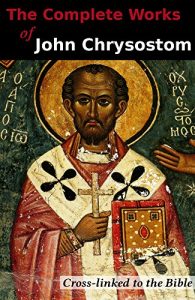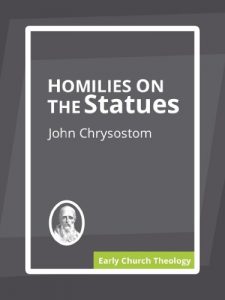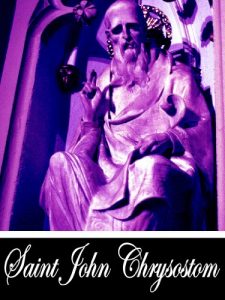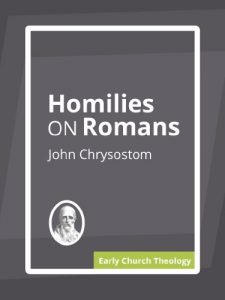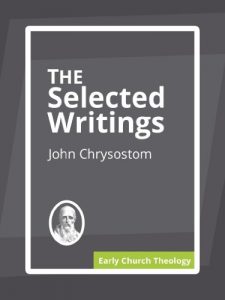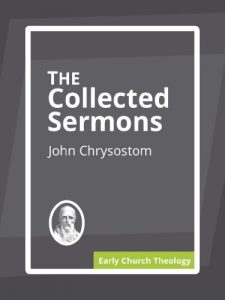St. John Chrysostom was born in the year 349 AD in Antioch. His father died soon after his birth and he was raised by his deeply pious mother. Under her influence St. John became devout as well, and took to studying scripture under the guidance of the bishop of Antioch who would later be the one to baptize him.
St. John was drawn to become a monk, and when he mother died he withdrew to the wilderness. There he wrote a number of works on the ascetic life. After a number of years he went to a cave to live in complete silence. He lasted for two years until his health declined and he was forced to come back into the world. He was ordained a priest in 386, and eventually earned the name, 'Chrysostom' (Golden-Mouthed) for his brilliant sermons. He was known for his love of scripture, and many of his sermons were compiled into commentaries.
In 397 he was chosen to be the bishop of Constantinople, which was perhaps the most important Christian office of its day. Although an extremely busy position, he nevertheless continued his literary output in the form of sermons, which he delivered in the great church, Hagia Sofia. Unfortunately his often fiery sermons did not sit well with the royal court. He was banished from the city once by the empress. Then a second time the empress had him removed and forcibly walked to a remote location. St. John did not survive the journey and died on Sept. 17, 407.
St. John Chrysostom left a tremendous mark on the Christian church. His liturgy is celebrated by Eastern Orthodox Christians almost every Sunday, and his homilies are considered by many to be the best every produced.
This collection brings together the full range of his extant works in the English language. Included in this eBook are cross-links from the texts to the King James Bible, which is included an appendix.
The following works are provided:
1. Homilies on the Gospel of St. Matthew
2. Homilies on Acts
3. Homilies on Romans
4. Homilies on First Corinthians
5. Homilies on Second Corinthians
6. Homilies on Ephesians
7. Homilies on Philippians
8. Homilies on Colossians
9. Homilies on First Thessalonians
10. Homilies on Second Thessalonians
11. Homilies on First Timothy
12. Homilies on Second Timothy
13. Homilies on Titus
14. Homilies on Philemon
15. Commentary on Galatians
16. Homilies on the Gospel of John
17. Homilies on the Epistle to the Hebrews
18. Homilies on the Statues
19. No One Can Harm the Man Who Does Not Injure Himself
20. Two Letters to Theodore After His Fall
21. Letter to a Young Widow
22. Homily on St. Ignatius
23. Homily on St. Babylas
24. Homily Concerning "Lowliness of Mind"
25. Instructions to Catechumens
26. Three Homilies on the Power of Satan
27. Homily on the Passage "Father, if it be possible . . ."
28. Homily on the Paralytic Lowered Through the Roof
29. Homily on the Passage "If your enemy hunger, feed him."
30. Homily Against Publishing the Errors of the Brethren
31. First Homily on Eutropius
32. Second Homily on Eutropius (After His Captivity)
33. Four Letters to Olympias
34. Letter to Some Priests of Antioch
35. Correspondence with Pope Innocent I
36. On the Priesthood
St. John was drawn to become a monk, and when he mother died he withdrew to the wilderness. There he wrote a number of works on the ascetic life. After a number of years he went to a cave to live in complete silence. He lasted for two years until his health declined and he was forced to come back into the world. He was ordained a priest in 386, and eventually earned the name, 'Chrysostom' (Golden-Mouthed) for his brilliant sermons. He was known for his love of scripture, and many of his sermons were compiled into commentaries.
In 397 he was chosen to be the bishop of Constantinople, which was perhaps the most important Christian office of its day. Although an extremely busy position, he nevertheless continued his literary output in the form of sermons, which he delivered in the great church, Hagia Sofia. Unfortunately his often fiery sermons did not sit well with the royal court. He was banished from the city once by the empress. Then a second time the empress had him removed and forcibly walked to a remote location. St. John did not survive the journey and died on Sept. 17, 407.
St. John Chrysostom left a tremendous mark on the Christian church. His liturgy is celebrated by Eastern Orthodox Christians almost every Sunday, and his homilies are considered by many to be the best every produced.
This collection brings together the full range of his extant works in the English language. Included in this eBook are cross-links from the texts to the King James Bible, which is included an appendix.
The following works are provided:
1. Homilies on the Gospel of St. Matthew
2. Homilies on Acts
3. Homilies on Romans
4. Homilies on First Corinthians
5. Homilies on Second Corinthians
6. Homilies on Ephesians
7. Homilies on Philippians
8. Homilies on Colossians
9. Homilies on First Thessalonians
10. Homilies on Second Thessalonians
11. Homilies on First Timothy
12. Homilies on Second Timothy
13. Homilies on Titus
14. Homilies on Philemon
15. Commentary on Galatians
16. Homilies on the Gospel of John
17. Homilies on the Epistle to the Hebrews
18. Homilies on the Statues
19. No One Can Harm the Man Who Does Not Injure Himself
20. Two Letters to Theodore After His Fall
21. Letter to a Young Widow
22. Homily on St. Ignatius
23. Homily on St. Babylas
24. Homily Concerning "Lowliness of Mind"
25. Instructions to Catechumens
26. Three Homilies on the Power of Satan
27. Homily on the Passage "Father, if it be possible . . ."
28. Homily on the Paralytic Lowered Through the Roof
29. Homily on the Passage "If your enemy hunger, feed him."
30. Homily Against Publishing the Errors of the Brethren
31. First Homily on Eutropius
32. Second Homily on Eutropius (After His Captivity)
33. Four Letters to Olympias
34. Letter to Some Priests of Antioch
35. Correspondence with Pope Innocent I
36. On the Priesthood
